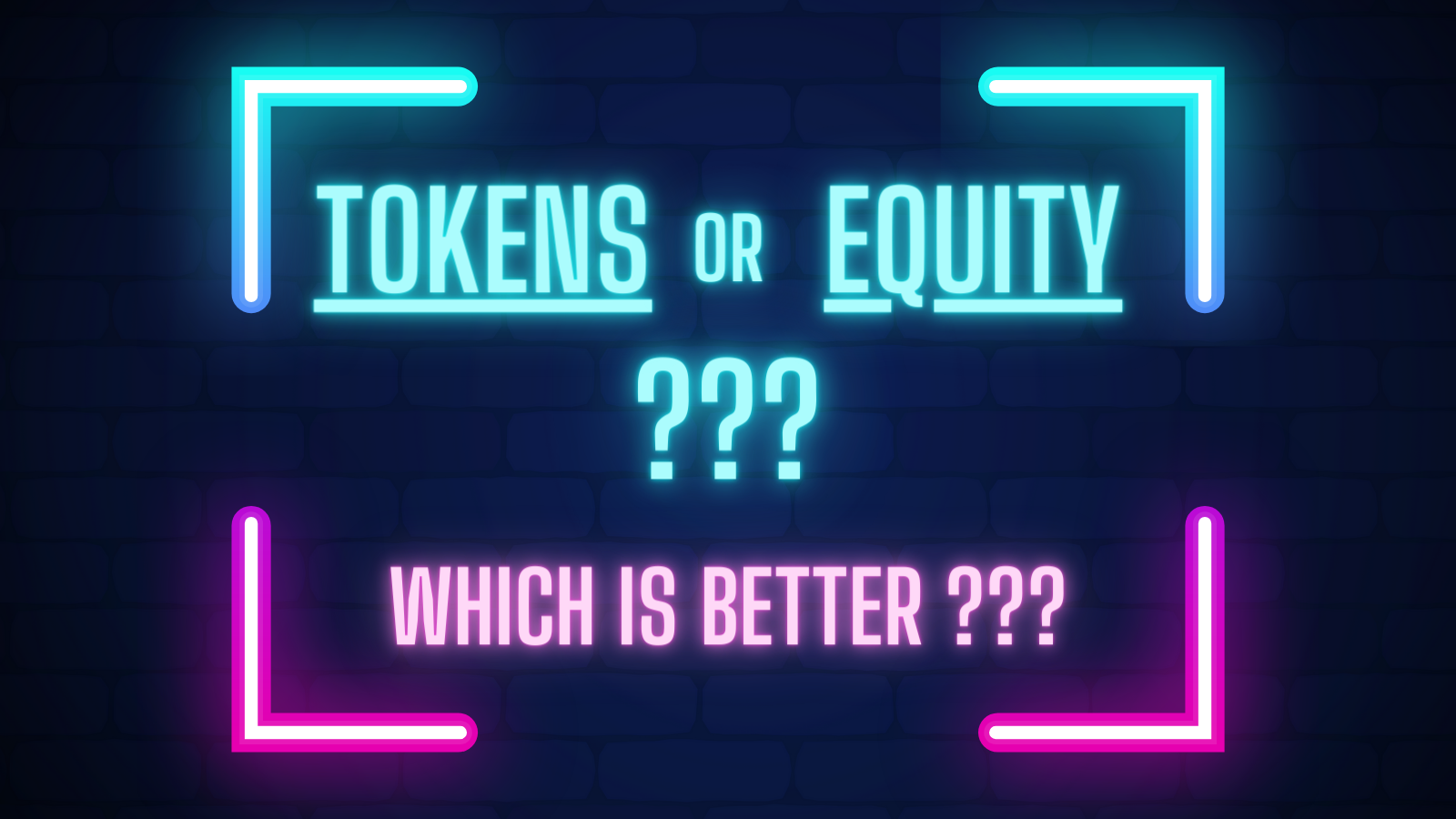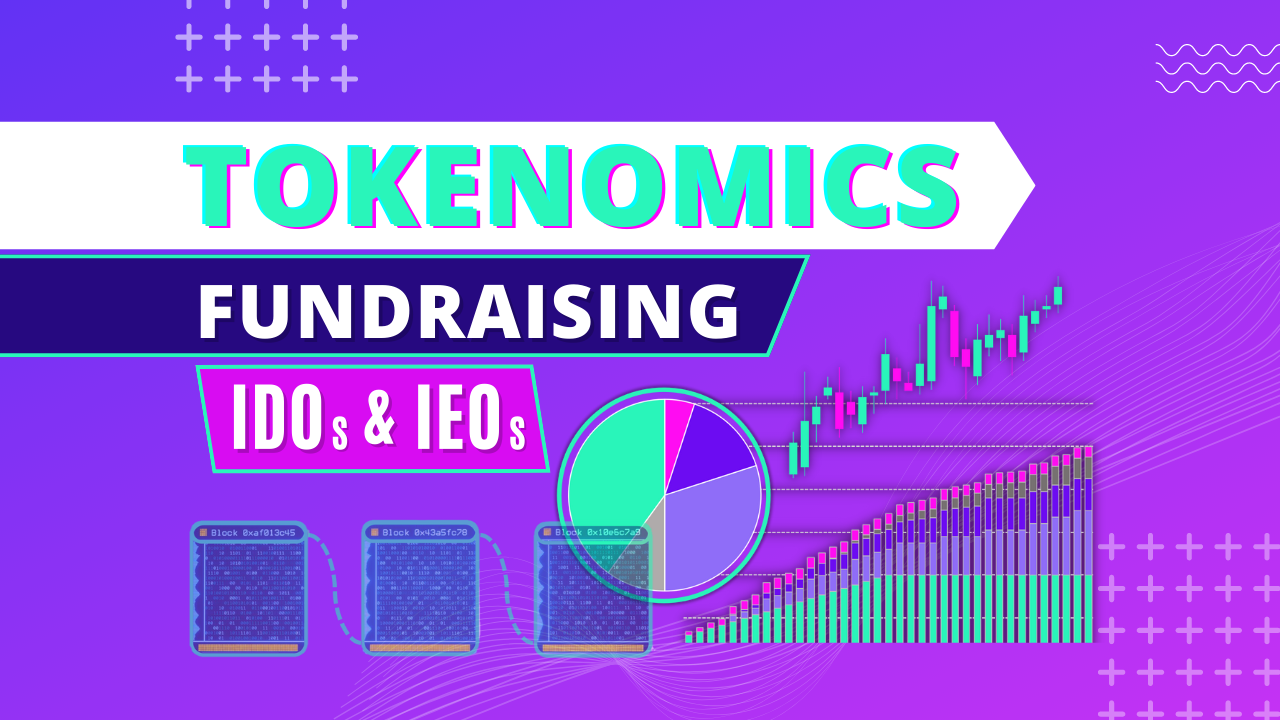
Learn more tokenomics
Watch video version of this article
Click to subscribe:
Previously...
We have now conducted a survey of many fundamental aspects of token sales, including how token sales are structured, one of the most common budgeting mistakes that founders make with them, and the special relevance of vesting in these offers.
This gives us enough background to ask an interesting question:
Should we raise our startup capital by selling tokens, or equity...?
Even if you are dead set on raising your funds through a token sale, this is still a valuable question to be able to answer.
It requires you to have a clear understanding of the differences between tokens and equity, and that will help you form a realistic appraisal of the risks and benefits of choosing to fundraise with a token sale.
We shall see that there are material differences to consider concerning:
- Legal rights and protections
- The way financial returns are generated
- Interdependencies with key operating processes
- Investor and project alignment
Once we understand these differences, it will become clear that token fundraising is far from being a "free-lunch". And even if you decide that the benefits weigh in its favour, you will need to make preparations to handle the risks and trade-offs that come attached.
Let's dive in!
What are the investors actually buying...?
The first step to making real comparison between token and equity fundraising, is to take a close and careful look at what these things are, that investors willingly buy off the project, in exchange for their money.
Equity and tokens do bear superficial similarities. Both are "created out of thin air", and appreciate in value with the growth of underlying business activity. The differences may be less noticeable at first glance, but they matter, and they underlie different trade-offs that each of these fundraising methods present to founders and investors.
Let's start with equity.
Specifically, the form that is most familiar to us and that's used in early-stage fundraising: company shares.
We are so used to thinking of shares being something we can buy and sell like goods at the supermarket, that we can overlook the fact that what they really are is a bundle of agreements. Agreements that define ownership privileges in relation to a company and its assets.
We rely on legal institutions to make these agreements more secure, and that means they are written and constituted as a set of technical legal terms. That means that first and foremost, equity shares are a legal contract.
So what legal rights do these contracts confer?
Well, the full details will depend on the legal jurisdiction and other specifics, but there are still some broad rights, of foundational importance are typically found in common. They include:
- Rights to vote on important company matters
- Rights to company records and information
- Rights to elect company directors
- Rights to participate in meetings
- Rights to sue for wrongful acts
- Right to a share of dividend
- Right to residual financial claims in the event of bankruptcy or liquidation
Company shares come packaged with much more than many casual investors realise!
Blockchain tokens, however, could not be any more different.
1. Tokens are NOT constituted from of legal terms, but out of executable code
They do not necessarily represent or define any legal rights or obligations.
This goes to the heart of what blockchain-based smart contracts were originally conceived to achieve. To deliver the execution of interparty agreements by means secure, decentralised computation, instead of by relying on legal institutions, agents, and intermediaries.
This is not to say that legal properties do not attach to smart contract code. But at the time of publishing in 2023, courts, lawmakers, and regulators are really only just beginning to map out those relationships.
In this current context, it is fair to say that tokens do not necessarily confer legal rights for their holders as equity contracts do. And that's an important difference.
2. The benefits that the underlying code provides for are varied, and do NOT conform to a standard
Blockchain tokens were conceived as entirely new kinds of assets, not a 1-for-1 replacement for existing securities. Developers leaned into the inherent flexibility and open-endedness offered by code to create a diverse range of token features and designs.
The end result is that blockchain tokens — in general — do not represent or confer a homogeneous set of user privileges.
The only thing that can be said in the general case, is that tokens grant holders the ability to interact with the protocol and any compatible smart contracts, on terms specified by their code and network conditions.
The TLDR; here is that:
- Early-stage equity investors get a well-defined and well-understood set of ownership rights that are backed by law.
- Early token-sale investors get a variable set of token-enabled protocol interactions, which may not come with any legal rights or protections.
With one exception...
...that applies for a specific kind of blockchain token called a security token.
This term initially arose in the context of earlier US SEC crypto enforcement decisions, that ruled that tokens that were coded to have 'security-like' features, would be classed and regulated as securities.
The complementary set of tokens that were not securities by the SEC's definition, commonly granted token holders access to some kind of 'utility' that was being provided by the network. And so, they ended up being called utility tokens.
In the time since the term was first coined, the concept of security tokens has evolved from being a regulatory artefact, into a positive design stance that seeks to fully replicate all the features of a conventional security, in tokenised form.
Tokenised equity offers a clear example. These security tokens are designed so that possessing one is identical to having registered ownership of a company share. This includes giving token holders all the associated legal rights and terms of a conventional equity contract.
At present however, security tokens only account for a minor share of current token fundraising activity.
This is because compliant security issuance comes with a lot of onerous and costly obligations.
These rules were never designed for startup-sized enterprises, and as a result there remains a HUGE incentive for blockchain startups to design their tokens to be as utility-like as possible, in order to be able to raise startup capital without these overheads, frictions, and constraints.
What many founders fail to anticipate however, is that the choice to fundraise by selling utility token — specifically — ends up having consequences that affect the health of their token economy and the financial options of their treasury.
To understand how that occurs, we first need to look at how investors generate financial returns from these two investment instruments...
How do investors make a financial return?
By selling them.
In that simple sense, the way that investors generate returns from these assets is the same... But in all other details — how the sale is made, and economic logic underpinning its return — they are starkly different.
Let's start by looking at equity first...
We just saw that equity shares offer a significant bundle of rights. Nevertheless, the value of equity shares are strongly tied to fundamental business performance (often sales and profits), and how these are expected to change in the future.
Originally, these fundamentals related to the likelihood of a company paying a cash dividend, at which point the shares generate an intrinsic cash benefit for their holders.
The action of business fundamentals on share prices, also offers a separate independent source of return for investors (even without dividend).
For early-stage investors, waiting for dividend is not an option. It takes too long, might never happen, and then it takes a long time for dividends to add up to a good return mathematically.
So that leaves them to rely on price appreciation.
But returns from price appreciation, only materialise upon sale... This is problematic for early-stage equity, because the options to buy and sell at this stage of a company's development, are LIMITED.
One option is to sell (or "exit") on a later private investment round.
For this to be attractive however, the valuation needs to have increased substantially. But that only will occur when a company has grown and developed significantly. That is likely to be a significant time after the initial investment was made.
An alternative is to wait until the company lists its shares on a public exchange.
Selling at this point comes with added benefits for investors.
The shares earn a significant additional value premium, owing to the increased supply of public buyers, and the ability to transact with them much more conveniently and at much lower cost than when private.
But getting to this point (if they company ever does!) also takes even longer! To get a rough sense, the median time it took startups to go from seed round to IPO, varied around 6-7 years in the US, pre-Covid.
All this makes it very clear that traditional early-stage equity investing is a LONG game.
Tokens offer investors a contrasting alternative...
...they come with liquidity "straight out of the box" — far earlier in the life of an enterprise than would occur for equity. This is possible due to:
- Permissionless peer-to-peer transaction being a core feature of all public blockchain applications since Bitcoin
- Various blockchain-native market institutions that enable buyer-seller matching and transaction with light requirements, at low cost
This low cost, highly disintermediated infrastructure for peer-to-peer exchange is an impressive economic innovation, no doubt! But it is also controversial and problematic.
They allow tokens to be 'publicly traded' before they even have their associated product or services up and running, and facilitate schemes for market abuse.
But that's a whole other can of worms!
Let's do ourselves a favour here and assume that we ARE dealing with a well-intentioned project, that genuinely aims to build a great, useful innovation for its community.
Well it turns out that even in these favourable circumstances, early token liquidity still poses risks to a project's financial sustainability and the integrity of its token economy.
To understand why, we now need to look at what happens when tokens are sold...
How does selling impact the business?

We've just seen that:
- Equity and tokens both need to be sold for investors to generate a fair return
- Tokens can be sold much much earlier than equity, and at negligible cost
We are now going to see that there important differences in what happens when each of these asset types are sold. Crucial to this difference are...
The properties of 'utility tokens'
Recall that due to regulations, these are the token type that are typically being sold, and are designed to offer access to some good or service.
This is commonly achieved by tokens offering claims that are fulfillable within the token economy (as opposed to in external token exchange markets), and/or using the token as an incentive instrument, to help support the economic activity that the network was created to foster.
There are two key takeaways from this:
- Utility tokens are working assets within their token economies
- Token value is likely to be important to how they function
This means that exchange market events can impact the economic activities that utility tokens support
Equity contracts are not like that at all.
They are NOT working assets in the economic process that they were issued to finance.
To illustrate, if Musk tweets something silly and the price of Tesla shares tank, there is no immediate effect on how Tesla dealerships or manufacturing lines operate.
By contrast, if a utility token used as an incentive suffers a price drop, the power of that incentive decreases immediately, affecting the economic activity supported by it.
These issues are made more acute by the fact that while token liquidity is available earlier for tokens...
Token liquidity is generally not high quality in a project's early stages.
It is often thin (few buyers and sellers), less resilient to shocks, and frequently fades over longer time periods (fewer buyers and sellers over time).
These market structures exacerbate token price volatility... all during a phase of growth where the token economy is still developing and may itself be more sensitive and fragile to these shocks as a result.
IN SUMMARY:
We see that projects fundraising with a utility token are committing to building an enterprise that is closely entwined with and affected by what occurs in token exchange markets.
The choice to raise funds by selling the utility tokens of their economy to investors, can compound the challenges they face in this regard, creating added instability for their token economy, and challenging the spending power of the project's token treasury.
Perhaps this wouldn't be a problem if the largest financial investors are incentivised to act responsibly; in a way that aligns with users and long-term project goals...
But that begs the question... Are they???
E pluribus unum?

You COULD argue that token investors' interests are aligned with the project...
They are token holders... just like the users, and project agents. This means they all have shared exposure to the token's financial performance, and that increases the likelihood that they will act to shared benefit.
Unfortunately this argument is too simplistic, and reality clearly does not bear it out.
The interests of these parties do not just depend, simply, on whether they hold tokens or not, but also upon:
- How the tokens are distributed
- Differences in agent investment horizons
- The price at which these different actors acquired their tokens
- How actors get value from tokens: from the token economy, or exchange markets
These differences create strong DISALIGNMENTS between stakeholder groups... and these disalignments now come with SHARPER consequences, precisely because all parties now hold the same token.
That exposes everyone to negative effects of actions taken by other groups that don't share the same interests.
The disalignment between early-token sale investors and other groups, in particular, are highly economically significant. Those investors:
- Are primarily motivated by the goal of generating a financial return, which is most easily done in a public exchange (not by using the token in its economy for its utility)
- Hold large number of tokens relative to others, (with no restrictions on their use applying once they are fully vested)
- Bought tokens at significant price discounts relative to all other parties who paid to acquire them since the listing date
Again, once those tokens are fully vested, there are no longer any controls upon them. The same features that facilitate early token liquidity on blockchains, also give investors unrestricted discretion to do what they wish with them. This can even invites investors to pursue adversarial trading strategies against the other stakeholder groups.
Equity again, does not suffer from any of these complications.
The main reason why, we stated earlier: equity contracts are not working economic assets.
Financially driven transactions with them do not have a direct, immediate impact on economic operations, and we don't have to worry about incentive alignment in the first place.
But as we are looking at alignment specifically, it is worth noting that the financial relationship between founders and investors also happens to be much closer and cooperative in the equity case. Before a public listing, there is no way that investors could sell their stakes without founders being aware, or indeed, without requiring substantial cooperation on their part.
So... Tokens or Equity...???

We've covered a lot of material!
The emphasis has been on explaining complexities that occur when projects fundraise with a sale of utility tokens... because I find that these are the details that are not obvious, and that are under-appreciated by founders.
But this is not intended to drive to a conclusion that we should never fundraise with utility tokens... but simply to bring attention to the fact that there are trade-offs involved, and that different preparations need to be taken to manage these new risks:
- Take extra care with your budgeting and your treasury management strategy and practice
- Stress test what the impacts of external price falls may be on your token economy, taking investor holdings into account
- Create mechanisms to mitigate those risks where possible
- Pay careful attention to how token distribution and vesting schedules are arranged
- Make efforts to screen for the highest quality investors possible
If you feel prepared to assume those risks, the factors that can count in favour of fundraise by presale of utility tokens include:
- Time and cost constraints that make a conventional equity raise unviable
- Buoyant market conditions that can absorb investor liquidations
- Confidence the project can earn the backing of true long-term responsible investors
The practical reality however, is that the immense regulatory disparity that remains between raising capital by means of compliant security issuance, vs. the sale of a utility token, is going to overwhelm all considerations for many projects. For now at least.
In the next coming years, as that gap closes, founders should be able to engage in a more even-handed assessment about whether they still want to fundraise with utility tokens, or create a tokenised financial instrument that doesn't come with so many complexities.
Another way the disparities could be closed, is through innovation in the contract format itself. Possibilities could include:
- Milestone driven token vesting (tying token releases to verifiable project fundamentals)
- Contingent investor liquidation rights (tying the right to sell to verifiable market conditions)
- Hybrid token-equity instruments (with embedded options or conversion triggers)
Smart contract and oracle advances, as well emerging innovations around programmable blockchain wallets could enable all this... But there's no broad move towards these approaches just yet. They are just my personal speculations for now...!

Roderick is a blockchain professional, specialising in tokenomics advisory and economic design.
His advisory contributions have helped raise over $100m for blockchain startups, and he brings over 10 years of prior quantitative modelling, financial analysis, and transaction experience to his work.
He resources the innovative thinking needed for this emerging field with strong academic foundations that include a MSc. in Economic Policy from UCL, and the CFA Charter.
Roderick is inspired by the potential he sees for blockchain technology to address old, long-standing economic issues that many students are still being taught are impossible be solve.
A life-long learner, he eagerly participates in knowledge building by sharing his expertise through open blog and video content, and by offering specialised training courses to help aspiring professionals start out and advance in this field.


